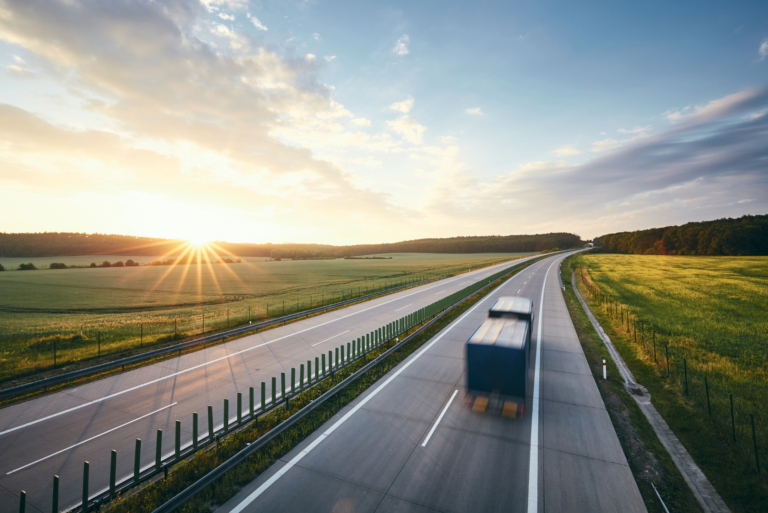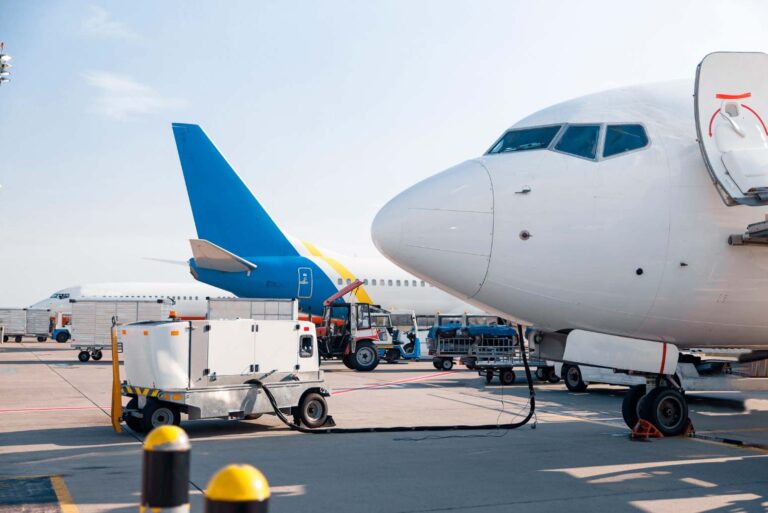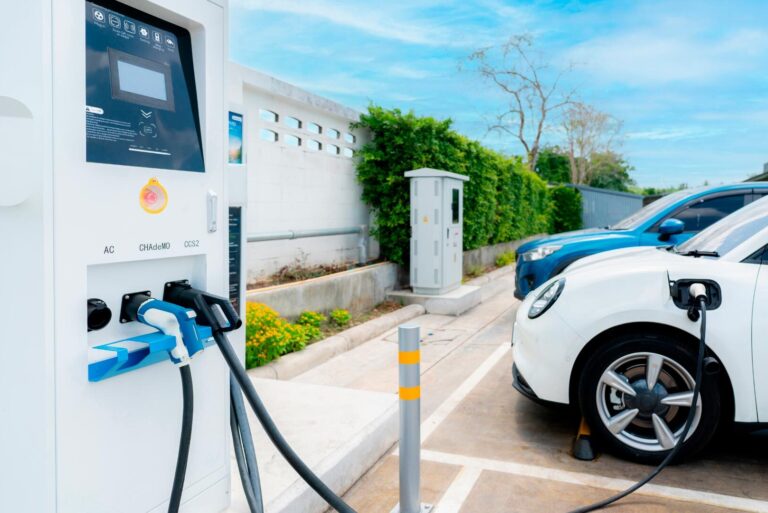Washington CFS Program
Rebates for EV fleets through Washington’s Clean Fuel Standard

Earning Rebates through Washington’s Clean Fuel Standard
The Washington Clean Fuel Standard (WCFS) is a program implemented on January 1, 2023 designed to reduce greenhouse gas (GHG) emissions from transportation fuels by incentivizing clean energy. The WCFS requires fuel suppliers to reduce their emissions or purchase offsets, which can be aggregated and sold by electric vehicle (EV) fleet owners.
By opting into the WCFS, EV fleet owners can earn energy credits for each metric ton of CO2 equivalent (MTCO2e) emissions avoided through the use of electricity-powered vehicles. Learn how you can take advantage.
Eligibility
Under the WCFS program, Washington EV fleet owners who are eligible to generate energy credits for electricity used as a transportation fuel include:
- Electric Vehicle Service Providers (EVSP)
- Electric Vehicle (EV) fleet operators, including buses and trucks
- Electric forklift fleet operators
What types of vehicles are eligible to earn CFS credits?
The following types of electric vehicles are eligible to earn credits in Washington. If you’re unsure whether your vehicle qualifies, contact us today.
- Electric / Hydrogen Forklift Trucks GSE
- Battery-powered Material Handling Equipment (MHE)
- Electric Transportation Refrigeration Units (eTRUs)
- Electric Trucks - All Classes and Yard Tractors
- Electric Buses and Shuttles
Am I required to opt into the program?
What happens if I don’t opt in?
If I only have one electric vehicle, am I still eligible?
Yes – Washington-based businesses of any size are encouraged to enroll with Smart Rebates™. You’ll earn monetary rebates regardless of your fleet size.
Application
EV fleet owners in Washington can apply to the CFS through our Smart Rebates™ program, which includes an in-person site audit that ensures a comprehensive and accurate estimate of your rebate earnings.
Unlike other credit aggregators that require you to fill out the information yourself, our on-site audits do all the paperwork for you and help you avoid the risk of misrepresented assets and any potential resulting audits and fines.

How can my company enroll in Smart Rebates™?
Companies interested in Smart Rebates™ must sign any Washington DOE-required paperwork and opt into Smart Rebates™ by signing the Participation Agreement. Next, you’ll allow SCT or our service providers to survey your site to assess and collect your forklift truck, MHE, transportation fleet, and battery charger data. Once your company is deemed eligible for Smart Rebates™, you’re only required to provide us with quarterly changes to your fleet. Contact us to get started.
How long does the application process typically take?
Reselling
Electric fleet owners in Washington receive CFS credits for every metric ton of CO2 equivalent (CO2e) emissions avoided. These are sold on the market to fuel producers that need to offset their own emissions. The energy credit market is based on supply and demand, so the values of credits may vary.
Credit aggregators like Smart Rebates™ manage the trading process, ensuring you earn the highest reward for your CFS credits. As one of the largest credit aggregators in the country, SCT has cultivated relationships with fuel producers and credit generators in Washington, enabling us to sell credits in bulk. This ensures electric bus, truck, and forklift owners earn the highest price for their CFS credits.
What kind of rebates can I expect to earn on a quarterly basis?
The CFS credit market is based on supply and demand, and varies with the type and quantity of EV equipment used. When you enroll with us, you’ll receive a no-cost on-site audit to get you an estimate of your quarterly earnings. Contact us to initiate the audit process.
How long can I expect to receive rebates?
The WCFS is currently planned to remain active until 2034; however, the program is expected to be extended to continue reducing Washington’s carbon emissions.
Rebates
Rebates are earned on a quarterly basis based on quantity and type of EVs, as well as on the supply-and-demand market of CFS credit trading.
You’ll receive quarterly checks that reflect the value of your sold CFS credits, which you can apply to any business expenses, including offsetting the cost of your EVs or buying additional vehicles to earn more credits.

What’s the catch?
There is no catch! The WCFS program is an effective tool designed to incentivize Washington businesses to reduce their carbon emissions and award investments in cleaner technologies.
When can I expect my first rebate check?
You’ll receive your first check 45 days after the end of the first reporting quarter.
Reporting
Electric bus, truck, and forklift owners that opt into the WCFS are subject to reporting and record-keeping requirements every quarter. Fleet owners that opt into the program without the help of a credit aggregator must submit quarterly and annual reports that must be uploaded and submitted through the Washington Fuels Reporting System by the following quarterly deadlines:
- June 30th – for the first calendar quarter covering January through March
- September 30th – for the second calendar quarter covering April through June
- December 31st – for the third calendar quarter covering July through September
- March 31st – for the fourth calendar quarter covering October through December
Meeting these deadlines can be time-intensive and subject to fines in the event of a misreport. By enrolling with Smart Rebates™, you don’t have to worry about missing important reporting deadlines – we’ll take care of all of that for you.
What happens if my site changes or if I purchase new EVs?
We’ll perform a no-cost in-person audit to alleviate the burden and compliance risks associated with reporting by accurately capturing relevant site and equipment usage.
How long can I expect to receive rebates?
The WCFS is currently planned to remain active until 2034; however, the program is expected to be extended to continue reducing Washington’s carbon emissions.
What happens if I report inaccurate data?
Inaccurate reporting may result in fines from the Washington Department of Ecology. Our in-person audit helps you avoid the risks associated with self-reporting.
Get More Information
When you enroll in Smart Rebates™, we’ll perform an in-person audit to give you an estimate of your earnings and ensure accurate reporting. We’ll handle the application, reselling, and reporting processes at no cost to you.
As a fleet owner in Washington, you’ll be able to earn additional revenue from your EVs with Smart Rebates™, with no risk of fines or inaccurate data readings. Ready to learn more? Get more information about our services for EV fleet owners.
Recent Updates in Washington
One Year of the Clean Fuel Standard: Impacts of Washington’s CFS - Since the implementation of the Clean Fuel Standard on January 1, 2023, Washington State has seen a steady… Read more >
Proposed Updates to the Washington State Clean Fuel Standard Will Expand to Regulate the Sustainability of Aviation Fuels - The Washington Department of Ecology (Ecology) recently proposed changes to the Clean Fuel Standard (CFS) that would introduce… Read more >
The Advanced Clean Cars II Rules: Oregon and Washington Following California's Lead in Zero-Emission Vehicles - In recent years, California has implemented incentives and regulations to push the adoption of clean fuels. Now, Oregon… Read more >


